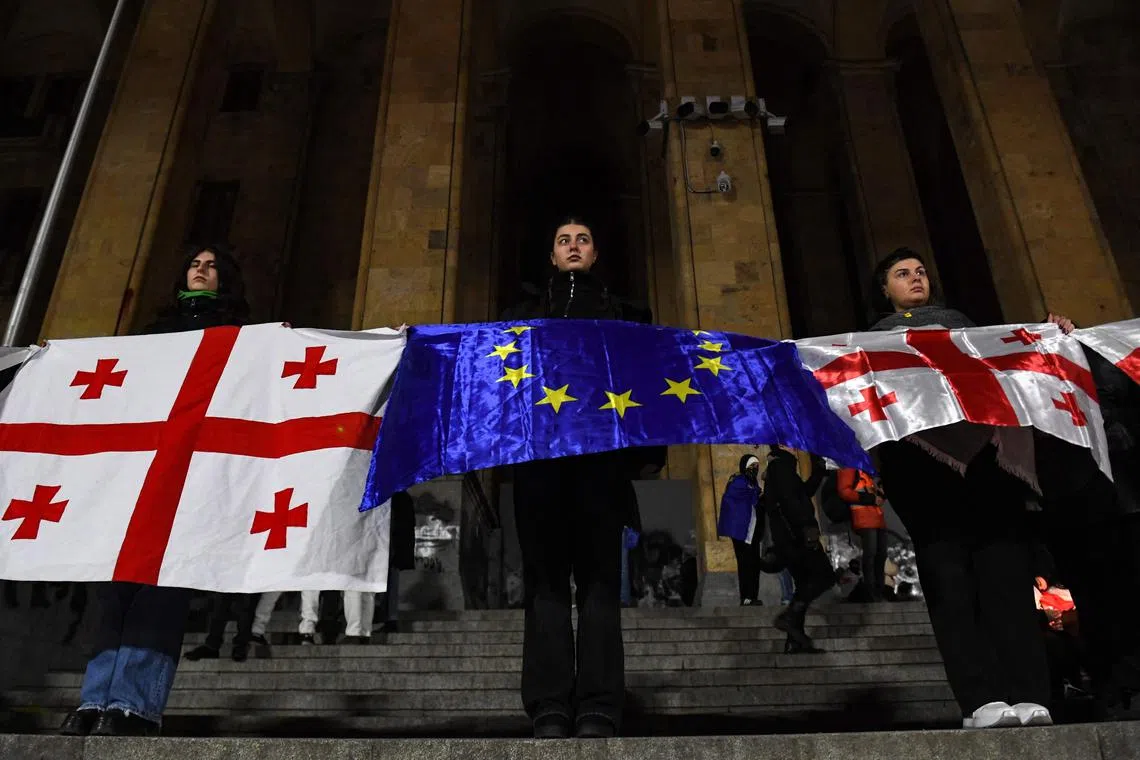Fresh protests in Georgia after PM vows to ‘eradicate’ opposition
Sign up now: Get ST's newsletters delivered to your inbox

Pro-EU protesters with flags of Georgia and the European Union rally in front of Georgia's Parliament building for an eighth consecutive day, on Dec 5.
PHOTO: AFP
Follow topic:
TBILISI - Thousands rallied across Georgia on Dec 5 for a second week of pro-European Union (EU) protests, after the Prime Minister threatened to “eradicate” the country’s “liberal fascist” opposition.
Tbilisi has been rocked by turmoil since the governing Georgian Dream party, which critics accuse of creeping authoritarianism and leading the country back towards Russia, claimed victory in a disputed election in October.
The government said on Nov 28 that it would suspend EU membership talks
Several thousand people gathered outside Parliament on Dec 5 for the eighth consecutive night of protests.
Some held signs reading “your repression will finish you”, in a reference to the government’s heavy-handed response to the demonstrations, an AFP reporter witnessed.
“This government has to change as they just don’t care about us, about future generations,” said Mano, a 23-year-old who declined to give her full name.
‘We will win’
As on previous nights, some demonstrators banged on the metal barriers blocking the Parliament’s entrance, waved EU flags and blew horns and whistles.
But turnout was initially lower than in the previous days.
Ms Nini Tchurghulia, 19, a history student wrapped in a Georgian flag, said she was worried that the movement might be losing steam but was nevertheless determined to continue protesting.
“We will win in the end,” she said.
Protests were also held in other cities including Batumi, Kutaisi, and Zugdidi, local media reported.
The reports said several demonstrators were arrested in Kutaisi.
Video footage shared on social media showed a teenager lying on the ground, semi-conscious, as protesters accused the police of using excessive force against him.
Earlier, Prime Minister Irakli Kobakhidze told reporters “we will do everything necessary to completely eradicate liberal fascism in Georgia”, escalating the government’s bitter campaign against its rivals.
“This process has already begun. These recent developments mark the start of the end of liberal fascism in Georgia,” he said, using language reminiscent of the Kremlin in Russia to target political opponents.
Masked police on Dec 5 raided several opposition party offices and arrested opposition leaders.
Mr Kobakhidze has refused to back down in the face of international condemnation, instead escalating a feud with pro-EU opposition groups that are demanding a re-run of the elections.
‘Unjustified violence’
Around 300 people have been detained and dozens injured, including protesters and police, in clashes outside Parliament in Tbilisi over the last week.
Several demonstrators, including journalists, have needed hospital treatment after being detained and, they allege, beaten by security forces.
Rights ombudsman Levan Ioseliani has accused the police of using “torture” against those detained at rallies. On Dec 5, he said that 191 protesters detained over the past week had reported mistreatment in custody, with 138 showing visible injuries.
On Dec 4, Georgian police arrested seven people for “organising and leading group violence” and seized crates of fireworks, which have been launched by protesters at riot police.
Opposition leader Nika Gvaramia of the Akhali party was beaten and detained during a police raid. Television footage showed him apparently unconscious, being carried away by masked security forces.
Another detained opposition politician, Mr Alexandre Elisashvili, was hospitalised with “serious injuries” he allegedly sustained in custody, his Strong Georgia opposition alliance said.
The US and other countries have denounced Georgia’s crackdown, threatening additional sanctions against the country’s leaders.
Mr Kobakhidze rejected statements by US Secretary of State Antony Blinken and said Tbilisi was hoping for better relations with Washington after Donald Trump takes office in January.
Russian turn
Critics of the government are enraged by what they call its betrayal of Georgia’s bid for EU membership, which is enshrined in its Constitution and supported by around 80 per cent of the population.
Several ambassadors and a deputy foreign minister resigned over the decision to suspend EU accession talks.
Galvanising the protest movement, a senior Interior Ministry official tasked with responding to the protests also quit on Dec 4, posting his resignation letter on social media accompanied by Georgian and European flag emojis.
The protests have drawn comparisons with the 2014 pro-EU revolution in Ukraine that ousted a Moscow-backed president.
Ukrainian President Volodymyr Zelensky on Dec 5 criticised Mr Kobakhidze and billionaire Bidzina Ivanishvili, widely seen as the country’s de facto leader, for “handing Georgia over to Putin”, in a video message referring to Russia’s President Vladimir Putin.
Since 2022, Georgia has advanced legislation targeting civil society and independent media, as well as curbing LGBTQ rights, measures critics say are based on repressive Russian laws. AFP

